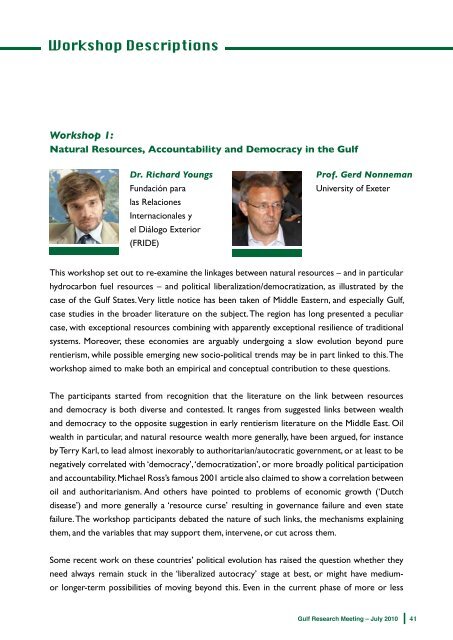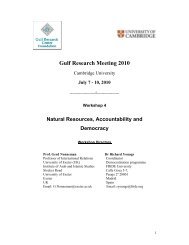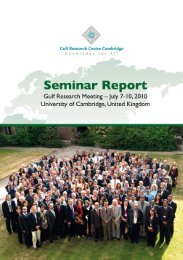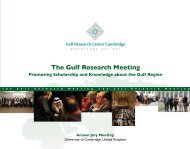GRM 2010 Report - Centre of Islamic Studies - University of ...
GRM 2010 Report - Centre of Islamic Studies - University of ...
GRM 2010 Report - Centre of Islamic Studies - University of ...
Create successful ePaper yourself
Turn your PDF publications into a flip-book with our unique Google optimized e-Paper software.
Workshop 1:<br />
Natural Resources, Accountability and Democracy in the Gulf<br />
Dr. Richard Youngs<br />
Fundación para<br />
las Relaciones<br />
Internacionales y<br />
el Diálogo Exterior<br />
(FRIDE)<br />
Pr<strong>of</strong>. Gerd Nonneman<br />
<strong>University</strong> <strong>of</strong> Exeter<br />
This workshop set out to re-examine the linkages between natural resources – and in particular<br />
hydrocarbon fuel resources – and political liberalization/democratization, as illustrated by the<br />
case <strong>of</strong> the Gulf States. Very little notice has been taken <strong>of</strong> Middle Eastern, and especially Gulf,<br />
case studies in the broader literature on the subject. The region has long presented a peculiar<br />
case, with exceptional resources combining with apparently exceptional resilience <strong>of</strong> traditional<br />
systems. Moreover, these economies are arguably undergoing a slow evolution beyond pure<br />
rentierism, while possible emerging new socio-political trends may be in part linked to this. The<br />
workshop aimed to make both an empirical and conceptual contribution to these questions.<br />
The participants started from recognition that the literature on the link between resources<br />
and democracy is both diverse and contested. It ranges from suggested links between wealth<br />
and democracy to the opposite suggestion in early rentierism literature on the Middle East. Oil<br />
wealth in particular, and natural resource wealth more generally, have been argued, for instance<br />
by Terry Karl, to lead almost inexorably to authoritarian/autocratic government, or at least to be<br />
negatively correlated with ‘democracy’, ‘democratization’, or more broadly political participation<br />
and accountability. Michael Ross’s famous 2001 article also claimed to show a correlation between<br />
oil and authoritarianism. And others have pointed to problems <strong>of</strong> economic growth (‘Dutch<br />
disease’) and more generally a ‘resource curse’ resulting in governance failure and even state<br />
failure. The workshop participants debated the nature <strong>of</strong> such links, the mechanisms explaining<br />
them, and the variables that may support them, intervene, or cut across them.<br />
Some recent work on these countries’ political evolution has raised the question whether they<br />
need always remain stuck in the ‘liberalized autocracy’ stage at best, or might have mediumor<br />
longer-term possibilities <strong>of</strong> moving beyond this. Even in the current phase <strong>of</strong> more or less<br />
Gulf Research Meeting – July <strong>2010</strong> 41





